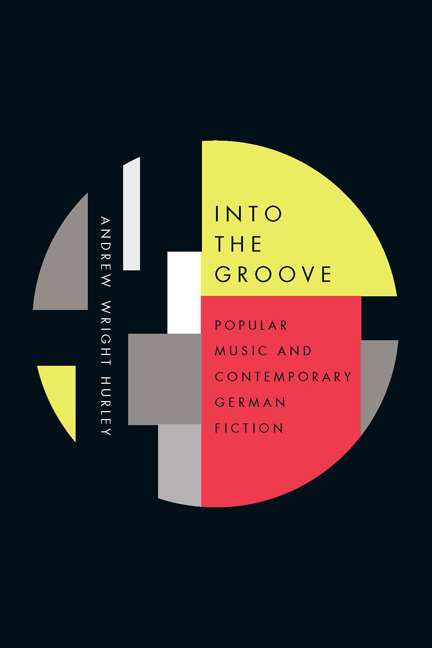Book contents
- Frontmatter
- Dedication
- Contents
- Acknowledgments
- Introduction
- 1 Preludes and Returns: Popular Music, the ʿ68 Generation, and the Literarization of the Jukebox
- 2 Enter the Double Agent: The German Popular Musician as Novelist
- 3 Techno-Lit: Electronica and Its Impacts on Fiction
- 4 Analogue is Better: Rock- and Pop-centric Literature
- 5 After the GDR's “Musical Niche Society”? Popular Music in the Literature of Thomas Brussig
- 6 The Gendering of Popular Music in the Novels of Karen Duve and Kerstin Grether
- Conclusion: Out of the Groove?
- Bibliography
- Index
Conclusion: Out of the Groove?
Published online by Cambridge University Press: 05 May 2015
- Frontmatter
- Dedication
- Contents
- Acknowledgments
- Introduction
- 1 Preludes and Returns: Popular Music, the ʿ68 Generation, and the Literarization of the Jukebox
- 2 Enter the Double Agent: The German Popular Musician as Novelist
- 3 Techno-Lit: Electronica and Its Impacts on Fiction
- 4 Analogue is Better: Rock- and Pop-centric Literature
- 5 After the GDR's “Musical Niche Society”? Popular Music in the Literature of Thomas Brussig
- 6 The Gendering of Popular Music in the Novels of Karen Duve and Kerstin Grether
- Conclusion: Out of the Groove?
- Bibliography
- Index
Summary
This book has attempted to disentangle and make sense of the spate of contemporary German musico-centric literature, focusing on novels published between 1997 and 2004. I have argued that the writing and publishing of musico-centric literature was not necessarily new—there were so-called Popliteratur precursors going back to the 1960s at least— but that a range of factors came together to reconfigure and consolidate literary attention on popular music. These factors included, in no particular order: The emergence of more “omnivorous” modes of cultural consumption, especially among a metropolitan, hedonist segment of readers-cum-listeners. The rise in interest in popular music among younger generations, and the desire of various writers to harness that music's qualities to “resensualize” literature. The moral and economic shocks to the German literary market as a result of unification. The desire of publishing houses to emulate successful models from the Anglo-American literary field, including, for example, Nick Hornby's High Fidelity (1995). The disappearance of music technologies, such as the jukebox and the mixtape, that had had a significant effect on the lives of some writers. The emergence of new musics, such as electronic dance music (EDM), and digital music technologies, such as sampling, that for some writers registered significant societal change or were a source of literary experimentation. The realization of East German writers that the GDR had an important history of popular music and politics. The general postunification rise in nostalgia in both eastern and western Germany. Various other factors motivated individual novelists. Thomas Meinecke became repoliticized via engaging with Cultural Studies and sought to reflect that in his novels. Benjamin von Stuckrad-Barre's motivation to write a novel was more experiential—his ennui in response to the German popular music industry and journalism.
Contrary to any simplistic employment of the term Popliteratur, particularly among those critics who used the term as an abject Other to worthy high literature, there was a wealth and diversity of musico-centric literature at this time, some of which I have explored in the preceding pages.
- Type
- Chapter
- Information
- Into the Groove?Popular Music and Contemporary German Fiction, pp. 228 - 234Publisher: Boydell & BrewerPrint publication year: 2015



